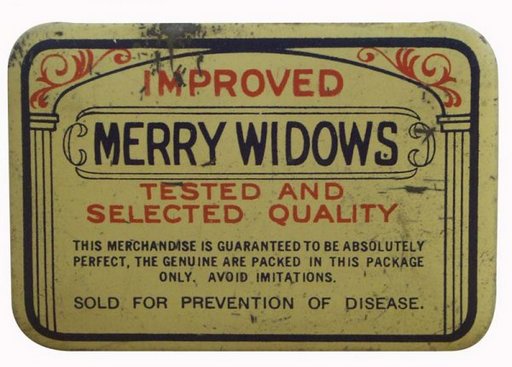September 8th, 2015 -- by Bacchus
Merry Widows Condom Tin
I’ve encountered the term “Merry Widows” as an old-fashioned slang term for condoms, but I never realized it was an actual brand name:
There’s a vast collection of vintage condom tins at Cardhouse.com, and about this one they write:
The term “merry widow” apparently originates from a 1907 ballet first performed in London. Then at some point condoms were called merry widows, possibly because of a 1920s play of the same name which was apparently chock full of double entendres.
Similar Sex Blogging:
This entry was posted on Tuesday, September 8th, 2015 at 1:38 pm. You can follow any responses to this entry through the RSS 2.0 feed. You can leave a response, or trackback from your own site.
Shorter URL for sharing: https://www.erosblog.com/?p=14853
Shorter URL for sharing: https://www.erosblog.com/?p=14853









Are you sure the origin of the phrase isn’t from Franz Lehár’s 1905 operetta Die lustige Witwe (that is to say, The Merry Widow, as it was quickly translated and performed in the English-speaking world?)
I own a contemporary recording of this operetta which includes an English language narration written by Tom Stoppard to replace the German dialog. Stoppard’s narration includes a line which surely deserves ErosBlog currency:
LOL! Nice quote. As for the origin of “Merry Widow”, I’m sure of nothing. Your precise citation sounds more plausible than the sloppy handwavium I quoted, though.
Only 7 years later, I saw this one from a link in a new entry.
The first use of “merry widow” in English is from 1567, according to the Oxford English Dictionary:
c1567 R. Copland “Jyl of Braintfords Test.” sig. Aiii This mery widow mastres Iyllian On a day dysposed ioyfully..Ordeyned a little banket of deinty.
The next three quotes they have are:
1787 Eng. Rev. May 355 The story of the ‘Merry Widow of Windsor’ is well told, and, if brought on the stage, might make an excellent after-piece to Shakespeare’s ‘Merry Wives’.
1827 G. Griffin Tales of Munster Festivals x. 117 The reader..had not, hitherto, been in any great danger of pining from an excess of good fortune, like the merry widow of Cornhill.
1884 J. Miller Memorie & Rime iv. 171 ‘Why, Mr. Livingston !’ cried the merry widow, entering the stockade as Madge left it.
Lehár’s operetta certainly popularised the phrase after its English production in 1907. A hat of the style worn by Lily Elsie in the title role of the 1907 London production of The Merry Widow was called a Merry Widow, became fashionable and were referred to in the newspapers of 1908.
The film of The Merry Widow released in 1952 popularised “A type of strapless bustier or corset, often with garters attached.” as worn by Lana Turner in the film. As Lana said at the time: “I’m telling you: the Merry Widow was designed by a man. A woman would never do that to another woman.”
https://www.lana-turner.com/lana-turner-in-the-merry-widow-5-sept-1952/
https://www.lana-turner.com/5-sept-1952-merry-widow/
Of course, there have been merry widows for much longer than 450 years.